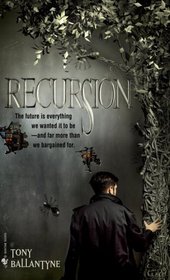"Recursion," Tony Ballantyne's crisply told tripartite tale, is filled with interesting characters and ideas.
Each of the three takes place in a different era, with different characters, who are (of course) all connected somehow. And we finally learn at the end just how. The tales are segmented into five parts each, followed by the conclusion, with each part ending with a tease before a segment of the next story begins. (But don't jump ahead, please! You'll be missing certain connections if you do.)
In what the publisher's copywriter judges to be the "main" story (it's the only one described on the back cover anyhow) in 2210 Herb Kirkham tries to build a city on a distant planet, only to find that his self-replicating machines have run amok. Worse, agent Robert Johnston of something called the Environment Agency suddenly turns up, right on his spaceship actually (now how did he do that?!), and gives him the choice of cooperation or incarceration. Choosing cooperation (of course!) Herb and Robert banter their way along as they fight the Evil Domain--a horde of self-replicating machines who've devoured thousands of planets.
Story 2 takes place in 2051. In its first segment we meet Eva, a depressed suicidal low-salaried worker in a nanny-state version of the UK, who attempts to commit suicide and ends up in an asylum. What seems at first as though it's going to be the most conventional tale of the three--Eva makes three friends in the asylum; they plan an escape, and so forth--turns out to be perhaps the most startling and provocative. It certainly becomes the most philosophical. It has a greyer tone, quite distinct from the banter and spark of Story 1.
Finally, in Story 3, which takes place in 2119, we meet Constantine, corporate spy ("ghost") who has four personalities implanted within him called red, white, blue, and the most sinister grey. He is to meet with his corporate colleagues in the city of Stonebreak, Australia, designed by, yep, self-replicating machines. They must decide whether to go ahead with an important project that is being developed on Mars. This one is sinister, nebulous, confusing--like good spy stories always are. It comes complete with a suspicious character, Mary, who meets Constantine at the very beginning and tries to offer him information before she . . .
It does all come together at the end, in an ambiguous way. And the ambiguity isn't because this is, yes, the first of three ("Capacity" and "Divergence" are the other two--and all three tales have now been published). Actually, it's complete in itself. No. The ambiguity is all about whether the characters have made the right choices.
Well have they?
I don't read much sci-fi but this one I could actually understand (I went thru several other books before finding this one). The theme was something we are closer to than ever as a sociey. Not all and everything that happened but for the most part of the story. I liked Herb the most.





